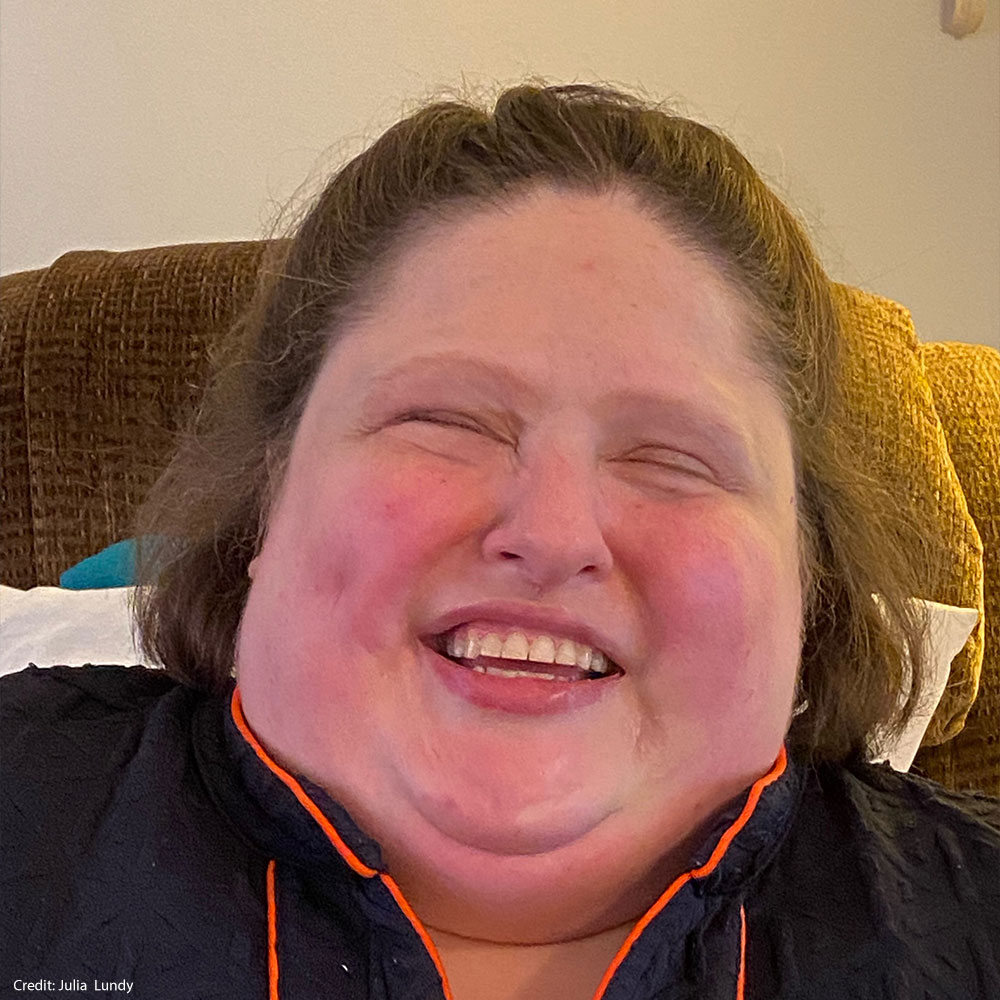
With the election just around the corner, we are chatting with some of our great volunteers about what issues are most important to them, and how they motivate voters to cast their ballots. We hope these conversations inspire you to vote for your values and join us in this once-in-a-generation battle to protect our nation.
Our first conversation is with Julia Lundy, a Maryland-based team leader with the ACLU People Power text team. People Power is the ACLU’s platform for grassroots action. Our volunteer teams help mobilize and organize communities all across the country in defense of our civil liberties by making calls, sending texts, and connecting with prospective voters about the issues that matter most to them.

A smiling Julia Lundy.
ACLU: What motivated you to get involved with the ACLU as a volunteer?
JL: I was very disappointed in the direction the country was heading in after the election of Donald J. Trump, the Muslim ban, and the selection of Jeff Sessions as attorney general. Jeff Sessions had said in the past that people with disabilities like me should not be in mainstream classrooms, which I was when I was growing up. There were just so many violations of law and decorum that really scared me.
ACLU: What experiences have informed your activism?
JL: As a person with disabilities, I was not able to vote on my own. For a while I was voting, but somebody had to fill up the ballot for me. And when I finally got the opportunity to go in there and vote on my own, it just felt like another level of freedom, because I was able to say what I wanted to say with no interference. This experience really motivated me to help vulnerable people and populations who can’t speak for themselves.
As a person with disabilities, I was not able to vote on my own. Somebody had to fill up the ballot for me. And when I finally got the opportunity to vote on my own, it felt like another level of freedom.
ACLU: How do you explain to people why voting is important, and persuade them to take part in upcoming elections?
JL: I always try to explain the impact a particular election will have on someone’s life. It’s also important to get across to a potential voter why their vote at this moment is so necessary. It’s not always clear how consequential something is until you think through it a little bit and you have to explain it to someone else. That’s pretty much the strategy I use to try to get people more on board when texting volunteers, and I find that it works pretty well.
ACLU: What has surprised you over the years in your activism?
JL: It’s surprised me how much through texting volunteers I am able to inspire people. And also, the level of what people are willing to do for what they believe in. In the beginning, it was very shocking. Some of the responses I got when texting supporters could be mean. But at the same time, I have found that there has been such an outpouring of support. And I’ve also learned over time not to jump to conclusions on a civil rights issue because there are angles that I haven’t even thought about. So, I’ve learned to ask more questions and try to get to the bottom of something before jumping to any kind of judgment. I found that all of this also has been extremely useful in my day-to-day life.
I always try to explain the impact a particular election will have on someone’s life. It’s also important to get across to a potential voter why their vote at this moment is so necessary.
ACLU: Why is the right to vote so important to you?
JL: I think being able to speak for yourself, and stand with people who have the same values as you, to get together and make the changes that we need to see, is empowering. Every vote counts. It’s amazing how a few votes can sway a whole election or how a bunch of votes can make a point. For example, look at the Kansas ballot initiative on abortion access. People came out and voted for their rights. You can’t make the change unless you give it a shot.
ACLU: Why did you decide to share your story? What else do you want people to know about your experience?
JL: Sometimes things can be difficult, like the moment we are going through as a country right now. But if you work hard at it, you can come to a solution as long as you all work together. I love working with the team of volunteers we have at the ACLU, and I love knowing that there’s that so many dedicated people that work around the clock to make the good work the ACLU does happen.
Interested in working with people like Julia to defend our rights? Find out more about how to get involved here.
https://www.aclu.org/news/voting-rights/midterm-elections-how-these-offices-impact-your-rights
Comments
Post a Comment